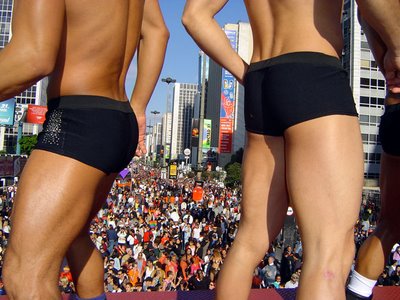 SAO PAULO, BRAZIL - When nearly 2.5 million people converged on Sao Paulo this year for the world's biggest gay pride parade, the celebration emphatically reminded Brazil's presidential candidates of the growing political clout of the gay community.
SAO PAULO, BRAZIL - When nearly 2.5 million people converged on Sao Paulo this year for the world's biggest gay pride parade, the celebration emphatically reminded Brazil's presidential candidates of the growing political clout of the gay community.Though it is the world's largest Catholic country, Brazil is increasingly tolerant of homosexuality and has long been one of the most sexually liberal nations in Latin America.
In Sunday's presidential run-off, even the conservative candidate, former Sao Paulo state Gov. Geraldo Alckmin, supports a stalled bill in Congress that would legalize gay civil unions. That has won him points with gays who attended the parade, but most support President Luiz Inacio Lula da Silva.
"I'd say 95 percent of gays will vote for Lula," said Luiz Motta, 60, founder of Grupo Gay Bahia, a gay rights group.
Many gays are suspicious of Alckmin because of his reputed connections to the conservative Catholic group Opus Dei, Motta said, even though he has denied belonging to it.
Though the presidential candidates have recognized the importance of the gay vote, they have carefully balanced their support for gays with the demands of the Catholic Church, whose priests can sway voting decisions of parishioners. Both candidates have shied away from backing full-scale gay marriage.
Lula's government is working on a program that would be funded by 15 ministries to combat homophobia and gay bashings.
Brazil's main gay groups have endorsed the former metalworker even though the president, known to enjoy off-color jokes, once said a southern city with a big gay population could boost its economy by exporting "faggots."
LITTLE EXPOSURE IN CONGRESS
Many politicians in Congress, led by former guerrilla fighter Fernando Gabeira, are sympathetic to gay issues. In the last Congress, nearly a fifth of the 513 representatives supported freedom of sexual preference.
But the new Congress has just one openly gay member. Homosexuals endorsed by Brazil's Gay, Lesbian, Bisexual and Transgender Association, the country's largest advocacy group, have never been elected to Congress.
In contrast, 40 Protestant fundamentalists, whose community is slightly larger than Brazil's estimated 18 million gays, won congressional elections this month.
Salete Campari, a 37-year-old drag queen who ran unsuccessfully for Sao Paulo's state Legislature, blames disorganization and a weak fundraising network.
"The gay community lacks unity and has many different groups fighting to control our direction," the Marilyn Monroe impersonator said. "And Protestant evangelicals believe more in who they are and aren't afraid to assert themselves."
Campari said he will run for office again as prejudice declines. The head of Brazil's Democratic Labor Party, Paulo Pereira da Silva, was elected to Congress after appearing in TV campaign spots with the drag queen -- a sign that his political career did not suffer because he supported a gay candidate.
Some gay leaders worry however that potential gains have been squandered.
Clodovil Hernandez, a gay TV host, was elected to the lower house of Congress this month, but he admitted he did not bother to develop a political agenda and has called gay marriage a sin.
"Clodovil won without any platform or obligation to gay issues whatsoever," said Paco Llisto, 27, a journalist for the gay Web site MixBrasil. "And his voters weren't gay. They were middle-class and lower-class housewives."
from The Washington Post
No comments:
Post a Comment